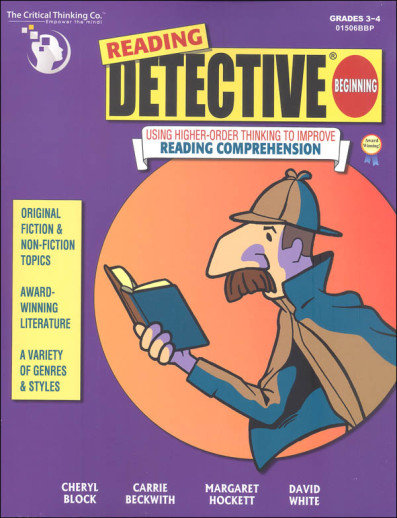We use cookies to make your experience better. To comply with the new e-Privacy directive, we need to ask for your consent to set the cookies. Learn more.
Reading Detective Beginning
These highly-effective, literature-based critical thinking activities develop the analysis, synthesis, and vocabulary skills students in Grades 3-4 need for exceptional reading comprehension. This 192-page activity book is especially effective at helping students understand challenging critical reading concepts such as making inferences, drawing conclusions, determining cause and effect, using context clues to define vocabulary, and making predictions and generalizations.
Students read and analyze short literature passages and stories that include fiction and nonfiction genres. Then they answer multiple-choice and short-response questions, citing sentence evidence to support their answers. Concepts and skills covered include:
Literary Analysis Skills
• Define vocabulary using context clues
• Recognize figurative language
• Identify main idea, supporting details, and theme
• Recognize literary devices
• Identify story elements: theme, plot, setting, and characters
I waited awhile for this product! Critical Thinking Press has tackled reading comprehension and critical thinking in this popular series. Reading and thinking should go hand in hand, but sometimes those skills need to be developed a little more. These excellent books use excerpts from award-winning authors, original fiction in a variety of genres and an assortment of nonfiction articles covering a broad array of topics and subject areas. Reading skills honed in the series include: comparison/contrast; distinguishing cause and effect; distinguishing fact and opinion; drawing conclusions; finding supporting details; identifying main idea; making inferences; making generalizations; making predictions; reading for details and information; sequencing; using tables, diagrams, and illustrations; recognizing analogies; predicting outcomes. Literary analysis is included here, too, as students will: analyze character traits; identify key events in plot; identify theme; identify setting; predict resolution; identify author's purpose; recognize figurative language; recognize conflict; recognize point of view; and sequence events. While all skills are developed, particular attention is given to those requiring critical thinking, such as inference and generalization. The goal is to teach students to think as they read to increase their understanding and retention of the material. To that end, instead of just answering questions about each reading passage, students are asked to support their choice, citing specific evidence from the passage (hence the "detective" part). Pre- and post-tests are supplied to help you determine which skills and lessons to focus on. Student books are consumable worktexts. A Teacher Overview contains an introduction to the program and how to use it, as well as answers to the practice activities. The answer key contains answers to the exercises in context; all of the passages and questions are included to aid in discussion. Beginning, A1, and B1 levels are all very similar in structure and content, but adjusted to different grade levels. Reading Detective Rx features low-readability, high-interest passages and exercises for the remedial reader.
Besides the interesting, varied selections, broad range of skills covered, and development of critical thinking skills, I also appreciate that the reading level is on target for the grade level (except for Rx). Many reading comprehension books seem to go to extremes to ensure that difficulty in actual reading ability doesn't impede the student in working through the lessons by lowering the reading level of the passages - resulting in overly simplistic passages that take most of the interest (and challenge!) out of reading.
| Product Format: | Paperback Book |
|---|---|
| Grades: | 3-4 |
| Brand: | Critical Thinking Company |
| Author: | Cheryl Block |
| ISBN: | 9780894557699 |
| Length in Inches: | 11 |
| Width in Inches: | 8.5 |
| Height in Inches: | 0.75 |
| Weight in Pounds: | 1.4125 |
| Ages: | 8 - 9 |
| Publication Date: | 4/5/2013 |
It took my kids about 15 minutes per lesson. After I graded it, I would go over any missed concepts which would take a few more minutes, but I loved the answer key because it gave thorough explanations for correct as well as incorrect answers.


Heard it’s a good supplement
one of the best companies for reading comp and critical thinking. bought several items in this collection over the years
We love the Mind Benders books from the same company, and thought we would give this book a try!
RECOMMENDED